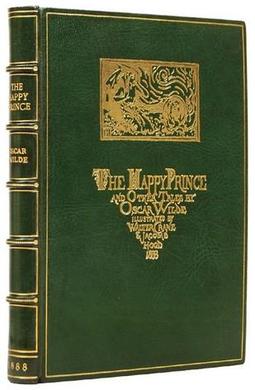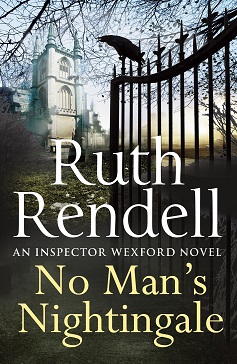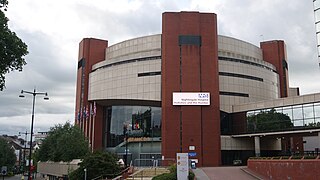Peter Nightingale may refer to:
- Petrus de Dacia (mathematician) (13th century), called Peter Nightingale
- Peter Nightingale (physician), president of the Royal College of Anaesthetists from 2009 to 2012
Peter Nightingale may refer to:

The Happy Prince and Other Tales is a collection of stories for children by Oscar Wilde first published in May 1888. It contains five stories: "The Happy Prince," "The Nightingale and the Rose," "The Selfish Giant," "The Devoted Friend," and "The Remarkable Rocket." In 2003, the second through fourth stories were adapted by Lupus Films and Terraglyph Interactive Studios into the three-part series Wilde Stories for Channel 4.

Annie Avril Nightingale was an English radio and television broadcaster. She was the first female presenter on BBC Radio 1 in 1970 and the first female presenter for BBC Television's The Old Grey Whistle Test where she stayed for four years.

Nightingale Island is an active volcanic island in the South Atlantic Ocean, 3 square kilometres (1.2 sq mi) in area, part of the Tristan da Cunha group of islands. They are administered by the United Kingdom as part of the overseas territory of Saint Helena, Ascension and Tristan da Cunha.

International Nurses Day (IND) is an international day observed around the world on 12 May each year, to mark the contributions that nurses make to society.

Ticehurst is both a village and a large civil parish in the Rother district of East Sussex, England. The parish lies in the upper reaches of both the Bewl stream before it enters Bewl Water and in the upper reaches of the River Rother flowing to the south-east. The parish includes the parish wards of Ticehurst, Flimwell and Stonegate. The linear settlements of Berner's Hill and Union Street lie between Ticehurst and Flimwell. It lies to the south-east of Tunbridge Wells, and is about ten miles (16 km) distant.

Warwick Alan "Wally" Nightingale was an English guitarist. He co-founded the band that went on to become the Sex Pistols.
The common nightingale is a songbird found in Eurasia.
The Nightingale and the Rose may refer to:

The Florence Nightingale Medal is an international award presented to those distinguished in nursing and named after British nurse Florence Nightingale. The medal was established in 1912 by the International Committee of the Red Cross (ICRC), following the Eighth International Conference of Red Cross Societies in London in 1907. It is the highest international distinction a nurse can achieve and is awarded to nurses or nursing aides for "exceptional courage and devotion to the wounded, sick or disabled or to civilian victims of a conflict or disaster" or "exemplary services or a creative and pioneering spirit in the areas of public health or nursing education". The Florence Nightingale Medal Commission comprises several members and staff of the ICRC, several of whom are nursing professionals, and the head nurse of the International Federation of Red Cross and Red Crescent Societies. A representative of the International Council of Nurses also participates in the work of the commission.
David Rothenberg is a professor of philosophy and music at the New Jersey Institute of Technology, with a special interest in animal sounds as music. He is also a composer and jazz musician whose books and recordings reflect a longtime interest in understanding other species such as singing insects by making music with them.

No Man's Nightingale is a novel by crime writer Ruth Rendell published in 2013, It featuring her recurring protagonist Inspector Wexford. The novel is the second in which Wexford has appeared after his retirement, and on this occasion is called in to consult on a crime by his ex-colleague and friend Mike Burden.
"Nightingale" is a song by American singer Demi Lovato from her fourth studio album Demi (2013). The song was written by Lovato, Anne Preven, Matt Rad, and Felicia Barton, while production was helmed by Rad and Preven served as a vocal producer.

Nightingale is a 2014 American drama film directed by Elliott Lester and written by Frederick Mensch. The film stars David Oyelowo. The film premiered on HBO on May 29, 2015.
The spotted nightingale-thrush has been split into the following:
James Nightingale may refer to:

The NHS Nightingale Hospital London was the first of the NHS Nightingale Hospitals, temporary hospitals set up by NHS England for the COVID-19 pandemic. It was housed in the ExCeL London convention centre in East London. The hospital was rapidly planned and constructed, being formally opened on 3 April and receiving its first patients on 7 April 2020. It served 54 patients during the first wave of the pandemic, and was used to serve non-COVID patients and provide vaccinations during the second wave. It was closed in April 2021.
Nightingale Hospital can mean:

The NHS Nightingale Hospital Birmingham was the second of the temporary NHS Nightingale Hospitals set up by NHS England to help to deal with the COVID-19 pandemic. It was constructed inside the National Exhibition Centre, Solihull, and opened on 16 April 2020. It cost £66.4 million to set up and was the most expensive of all the Nightingale temporary hospitals. On 1 April 2021 the hospital closed without ever treating a patient.

The NHS Nightingale Hospital North West was the third of the temporary NHS Nightingale Hospitals set up by NHS England in 2020 to help to deal with the COVID-19 pandemic. It was closed in March 2021.

The NHS Nightingale Hospital Yorkshire and the Humber is one of the temporary NHS Nightingale Hospitals set up by NHS England in 2020 to help to deal with the COVID-19 pandemic. The hospital was constructed inside the Harrogate Convention Centre, Harrogate, and from 4 June 2020 was repurposed as a radiology diagnostic clinic.